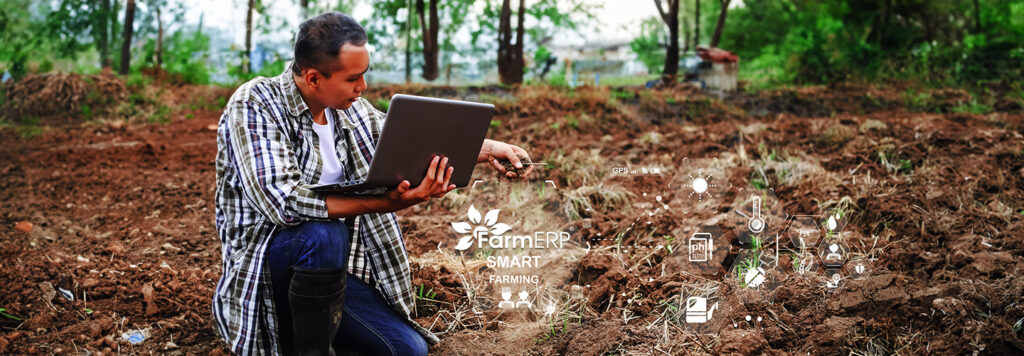Revolutionizing Agriculture: The Role of Crop Management Software in Precision Farming

Precision agriculture, enabled by crop management, is not just a trend; it’s the future of farming.
Modern agriculture is undergoing a revolution, and at its heart is precision agriculture. This innovative approach to farming uses technology, data, and a deep understanding of crops to optimize the agricultural process. And, one of the keys to the success of precision agriculture is effective crop management.
In this article, we will delve into how crop management plays a pivotal role in enabling precision agriculture, revolutionizing the way we produce food, and ensuring a sustainable future for our planet.
Major Challenges of Agriculture in the Present World
Today, the global agriculture industry faces an array of pressing challenges, each with significant implications for food security, sustainability, and economic well-being. One of the foremost concerns is the impact of climate change and weather variability. With shifting weather patterns, extreme events, and prolonged droughts, crop yields and livestock production are increasingly vulnerable.
Resource scarcity compounds these issues. As the global population continues to grow, demands for water, land, and energy resources intensify. Additionally, food security remains a pressing concern, with approximately 9.8% of the world’s population, or 828 million people, affected by hunger in 2021.
Meanwhile, the agricultural sector grapples with the loss of biodiversity due to habitat destruction and overreliance on pesticides and synthetic fertilizers. According to a 2021 UN report, the global food system is the primary driver of biodiversity loss, with agriculture alone being the identified threat to 24,000 of the 28,000 (86%) species at risk of extinction.
These challenges underscore the need for innovative, sustainable solutions to ensure the continued viability of global agriculture.
Understanding the Basics of Precision Agriculture and Crop Management
Precision agriculture is a farming management concept that uses technology to maximize profitability, sustainability, and environmental protection. It’s a significant shift from traditional farming practices, which often relied on guesswork and broad applications of resources. Moreover, precision agriculture aims to improve efficiency by tailoring actions to specific field conditions.
As agricultural challenges continue to intensify, crop management is becoming crucial in precision agriculture. It encompasses a wide range of practices, from selecting the right crops for the right conditions to managing soil health. Moreover, crop selection and rotation play a vital role in maintaining soil fertility and preventing pests and diseases. By understanding the needs of each crop, farmers can make informed decisions that optimize yield and resource use.
Key Milestones in the Development of Crop Management Software
Crop management software is a specialized digital tool used in agriculture to collect, analyze, and utilize data related to crop growth, resource allocation, and farm operations for optimizing yields and sustainability.
In the 1980s, Geographic Information Systems (GIS) started integrating maps and data for better farm management. The 1990s saw the emergence of farm management software, which enabled record-keeping and basic analysis. The 2000s witnessed the integration of GPS technology for precision mapping and automated machinery control.
Around 2010, cloud computing and mobile apps made data accessible in real time. In recent years, artificial intelligence and machine learning have empowered these systems to provide advanced insights, making crop management software an indispensable tool for modern precision agriculture practices.
Components of Crop Management Software Boosting Precision Farming
- Data Collection and Sensors: Utilizing GPS technology and remote sensing, these tools gather crucial data about soil conditions, weather, and crop health.
- Data Analysis and Decision Support: Machine learning and AI algorithms process the collected data, offering valuable insights and aiding decision-making. Weather forecasting capabilities assist in predicting optimal planting and harvesting times.
- Automation and Control Systems: Crop management software can control automated machinery and irrigation systems, ensuring precise and timely interventions.
- Integration with Other Technologies: These solutions seamlessly integrate with IoT devices and drones, further enhancing data collection and analysis capabilities.
How Crop Management Software Works
Crop management software operates through a data-driven process that optimizes farming practices. It begins with data acquisition, where sensors and devices collect information on factors like soil conditions, weather, and crop health. This data is then processed and analyzed using advanced algorithms, identifying trends and potential issues. The software provides actionable recommendations for decision-making, such as adjusting irrigation, applying specific fertilizers, or implementing pest control measures.
Real-time monitoring and feedback throughout the growing season allow farmers to make timely adjustments while ensuring efficient resource usage. In essence, crop management software empowers farmers with data-driven insights, transforming traditional farming into a precise, efficient, and sustainable practice.
Benefits of Crop Management Software in Precision Agriculture
When it comes to precision agriculture, crop management software empowers farmers with tools to maximize productivity, minimize resource waste, reduce risks, and make informed decisions, ultimately leading to more profitable, sustainable, and environmentally responsible farming practices.
- Increased Crop Yield
Crop management software utilizes real-time data and historical trends to optimize crop management practices. It provides precise information on when and where to plant, irrigate, and apply fertilizers and pesticides. By tailoring these actions to specific crop needs, farmers can significantly increase crop yields, which leads to higher profitability.
- Efficient Resource Utilization
Precision agriculture, driven by crop management software, minimizes resource waste. Farmers can precisely control irrigation systems, delivering water where and when it’s needed most. Similarly, fertilizers and pesticides are applied only where necessary, which in turn, reduces excess chemical runoff and environmental pollution.
- Environmental Sustainability
By minimizing chemical use and promoting soil health, crop management software contributes to sustainable farming practices. Reduced soil erosion and improved water management also help protect natural ecosystems, making agriculture more environmentally friendly.
- Risk Mitigation
Crop management software constantly monitors environmental conditions and crop health. When issues such as pest infestations or adverse weather patterns are detected, it alerts farmers, allowing them to take timely actions to mitigate risks and minimize crop losses.
- Economic Advantages
Beyond increasing yields, efficient resource utilization, and reduced operational costs, crop management software can help farmers with budget planning and financial management. It enables them to optimize their expenses, allocate resources effectively, and ultimately improve profitability.
- Data-Driven Decision-Making
The software provides farmers with data-driven insights that guide decision-making. By analyzing historical data, current conditions, and predictive models, farmers can make informed choices about planting, harvesting, and resource allocation, leading to better overall farm management.
- Time Savings
Automation features in crop management software streamline various farm operations to reduce manual labor. For instance, automated irrigation systems can be remotely controlled, which saves time and labor while ensuring precise water delivery.
- Accessibility
The advent of mobile apps and cloud-based solutions means that farmers can access their crop management software from smartphones, tablets, or computers, allowing them to monitor and manage their farms from anywhere, anytime.
FarmERP Emerges as Key Crop Management Software for Precision Agriculture
FarmERP acts as an effective crop management software that addresses the challenges and limitations of precision agriculture. It empowers farmers with data-driven insights, automation, and tools to enhance productivity, sustainability, and profitability.
Moreover, FarmERP ensures the security of sensitive farm data by offering robust access controls and encryption measures. It allows farmers to control who can access their data and ensures that data is stored securely in compliance with data protection regulations.
FarmERP also offers flexible pricing plans, making it accessible to both small-scale and large-scale farmers. Its user-friendly interface and mobile app support ensure ease of use and accessibility for farmers with varying levels of technological expertise.
Contact us to know more!
